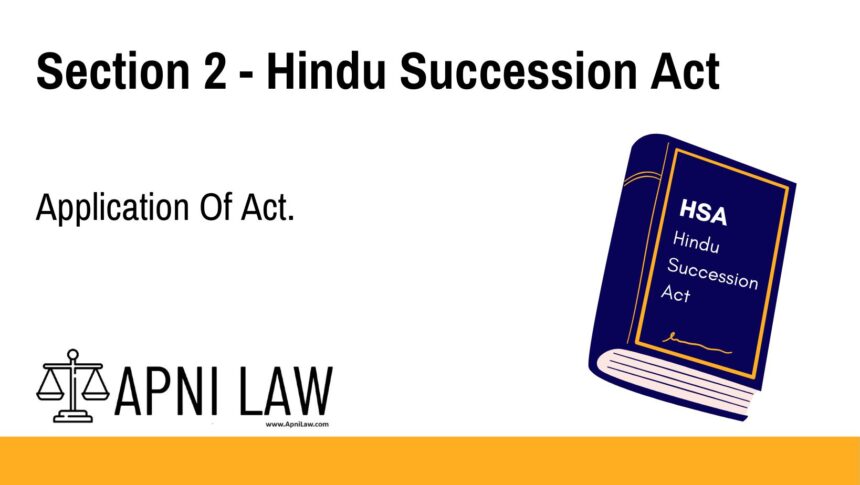Code: Section 2 – Hindu Succession Act
—(1) This Act applies—
(a) to any person, who is a Hindu by religion in any of its forms or
developments, including a Virashaiva, a Lingayat or a follower
of the Brahmo, Prarthana or Arya Samaj ;
(b) to any person who is a Buddhist, Jaina or Sikh by religion ;
and
(c) to any other person who is not a Musilm, Christian, Parsi or
Jew by religion unless it is proved that any such person would
not have been governed by the Hindu Law or by any custom
or usage as part of that law in respect of any of the matters
dealt with herein if this Act had not been passed.
Explanation :—The following persons are Hindus, Buddhists, Jainas
or Sikhs by religion, as the case may be :—
(a) any child, legitimate or illegitimate, both of whose parents
are Hindus, Buddhists, Jainas or Sikhs by religion ;
(b) any child, legitimate or illegitimate, one of whose parents is a
Hindu, Buddhist, Jaina or Sikh by religion and who is brought
up as a member of the tribe, community, group or family to
which such parent belongs or belonged ;
(c) any person who is a convert or reconvert to the Hindu,
Buddhist, Jaina or Sikh religion.
(2) The expression “Hindu” in any portion of this Act shall be
construed as if it included a person who, though not a Hindu by religion,
is, nevertheless, a person to whom this Act applies by virtue of the
provisions contained in this section.
Explanation of Section 2 – Hindu Succession Act
Section 2 of the Hindu Succession Act defines its scope of application, specifying the individuals it governs. It clarifies that the Act applies to individuals who:
- Hindus by Religion: This includes followers of various forms of Hinduism such as Virashaiva, Lingayat, and those from movements like the Brahmo, Prarthana, and Arya Samaj.
- Buddhists, Jains, and Sikhs: People who follow these religions are also governed by the Act.
- Persons Not Muslim, Christian, Parsi, or Jew: The Act also applies to any person not practicing these four religions, unless they can prove they were not governed by Hindu law before the passage of this Act.
Explanation of the Explanation:
- The section provides a definition of who is considered Hindu or follows the religions of Buddhism, Jainism, or Sikhism, including:
- A child born to parents of these religions (whether legitimate or illegitimate).
- A child with one parent from these religions who is brought up as a member of that community.
- Converts or reconverts to these religions.
Sub-section (2):
Excludes members of Scheduled Tribes unless explicitly directed by the Central Government. The Central Government can notify, through the Official Gazette, that the Act shall apply to certain tribes.
Sub-section (3):
Clarifies that the term “Hindu” under this Act is not confined solely to those who are Hindus by religion. It also includes individuals who are not Hindu by religion but come under the Act’s scope due to the conditions outlined in this section.
Illustration
Example 1: Application of the Act to a Buddhist
A Buddhist person from Kerala inherits property under the Hindu Succession Act, 1956. Despite not being a Hindu, they are governed by the provisions of the Act because they are a Buddhist by religion, as outlined in Section 2.
Example 2: Child of Mixed Religious Parentage
A child born to a Hindu mother and a Sikh father, raised as a Sikh, is recognized as a Sikh by religion under Section 2 of the Act and would be governed by the provisions related to inheritance and succession for Sikhs.
Common Questions & Answers on Section 2 – Hindu Succession Act
1. Does the Hindu Succession Act apply to Muslims or Christians?
- Answer: No, the Act does not apply to Muslims, Christians, Parsis, or Jews. However, it can apply to individuals who are not governed by their respective personal laws and who would have otherwise been governed by Hindu law.
2. How does the Act define a “Hindu”?
- Answer: The Act defines a “Hindu” to include anyone who follows Hinduism or related religions like Buddhism, Jainism, and Sikhism, including children of these religious communities, and even converts or reconverts to these religions.
3. Are members of Scheduled Tribes covered by the Hindu Succession Act?
- Answer: Generally, no. However, the Central Government can issue a notification applying the provisions of the Act to specific Scheduled Tribes.
4. What if a person is not Hindu by religion but is governed by Hindu law?
- Answer: Under Section 2(3), a person who is not Hindu by religion but otherwise meets the conditions outlined in the section can be governed by the Act.
Conclusion
Section 2 of the Hindu Succession Act lays the foundational rules for determining who is subject to the provisions of the Act, covering not only Hindus but also Buddhists, Jains, Sikhs, and certain other individuals who fall within the defined categories. The section ensures the law’s broad application to those governed by it, including children of these religions and converts.
For detailed legal insights and guidance, visit ApniLaw today!








